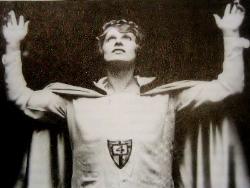
Norma Jeane Mortenson never knew her father, and was raised by a series of strong, spirited women. Although she was born in Los Angeles, her earliest years were spent with the Bolenders, a foster family in the small town of Hawthorne, California. And her first influences came not from movies, but religion.
Nearby Los Angeles was a growing city, and at the start of the twentieth century, Hollywood was still farmland. By the time Norma Jeane was born in 1926, the movie industry was the talk of America. Gladys, Norma Jeane’s mother, worked for the studios, cutting film in a laboratory. With no man to support her,
she was unable to work and care for her baby.
The Bolenders were neighbours of Della Monroe, Norma Jeane’s grandmother. They were devout Christians and fostered other children too, including a baby boy called Lester.
Della was prone to bouts of melancholy, and rages. As her health declined, she often seemed confused.
Though Della visited her granddaughter daily, the Bolenders tried to keep her at arms’ length. Della sought comfort in the teachings of Aimee Semple McPherson, who had founded the Foursquare Gospel Church in Los Angeles.
Aimee was a charismatic woman who had gained a huge following throughout California and beyond. Her blend of tub-thumping morality and self-promotion seemed ideally suited to a city that embraced the spectacular.
In March 1926, three months before Norma Jeane was born, Aimee’s abduction had caused a sensation. When she reappeared in Mexico with a lover, the press speculated that the whole incident had merely been an elaborate hoax. Nonetheless, Aimee’s popularity soared.
By December Aimee was back in Los Angeles, and on trial. She was accused of lying about her ordeal, but the case would soon be abandoned due to lack of evidence.
Meanwhile, Della’s influence on her granddaughter was slipping. That month, she persuaded the Bolenders to baptise Norma Jeane in one of Sister Aimee’s chapels.
Della died of heart disease within a year, after being confined to a state asylum. Norma Jeane stayed with the Bolenders, seeing her mother Gladys at weekends. Wayne and Ida Bolender ensured that the little girl was brought up in their mutual faith.
One of the first songs Norma Jeane learned was ‘Jesus Loves Me, This I Know’, and she often sang it unprompted.
As she grew older, Norma Jeane did her share of the household chores and attended Sunday school with Lester, her constant companion. At the height of the Great Depression, Wayne held a secure job as a postman, and the family was never in debt. Everything they had was shared among their growing brood of
fostered children.
But there was little room for fun or frivolity in the Bolender household, and their rigid discipline was at times too restrictive for Norma Jeane.
‘It was hard to please them,’ she admitted. ‘Somehow I was always falling short, although I can’t remember being especially bad.’ Instead, she retreated into a fantasy world and experienced a recurring dream that would have shocked the Bolenders.
‘I dreamed that I was standing up in church without any clothes on,’ she said, ‘and all the people there were lying at my feet on the floor of the church, and I walked naked, with a sense of freedom, being careful not to step on anyone.’
When Norma Jeane was six, Ida took her on a rare outing to Los Angeles. That Easter, Norma Jeane and the other Sunday school children joined a pageant at the Hollywood Bowl. When she saw Sister Aimee on the stage, Norma Jeane was transfixed. This was Norma Jeane’s first taste of how a performer could hold
hundreds of people under her spell.
Aimee wore a variety of costumes and used lights, music and mirrors to dramatic effect, driving the congregation wild. Norma Jeane joined fifty other children, arranged as a living cross. But as they prepared to take their cue, she lost her focus.
‘We all had on white tunics under the black robes and at a given signal we were supposed to throw off the robes, changing the cross from black to white,’ she explained. ‘And there I was – the only black mark on a white cross.’
For a brief moment, Sister Aimee was upstaged by a shy little girl. But even in her embarrassment, Norma Jeane shared the thrill of being looked at by the crowd. It was a feeling that she would never forget.
A year later, Norma Jeane had left the Bolenders’ care and was living with her mother in Hollywood. This marked the end of her most tranquil years, and a step towards uncertainty.
Although Sister Aimee continued with her preaching and charitable works, she was no longer the darling of the press. In 1944, she died alone in a hotel room, having overdosed on barbiturates.
It was a grim reminder of the way many women were isolated by their own ambition in wartime California, and left with nowhere else to go.
By Tara Hanks






